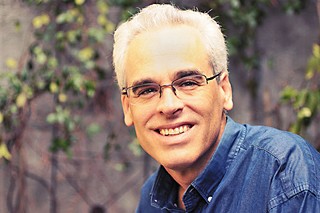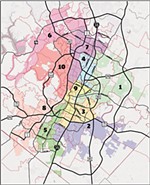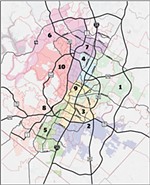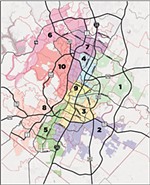How to Build Neighborhoods
District 9 candidates differ most sharply on best principles of land use
By Amy Smith, Fri., Sept. 5, 2014
Council members Chris Riley and Kathie Tovo have many things in common. They live in older, quaint Central Austin neighborhoods, they're both former neighborhood association presidents, they've served tenures on the city Planning Commission, and they have long histories of civic and community engagement. On the dais, they currently sit one seat apart from each other – the last ever "Place 1" and "Place 3" Council members, in the final at-large Council. And they share many of the same socially progressive values.
Most notably, Riley and Tovo are both savvy land-use aficionados – and that's precisely where their similarities end. The two rivals, drawn into the same District 9, hold sharply distinct views on how growth and development should be managed in Austin's expanding central city – a contrast that could well be the crux of this highly competitive Council race.
Riley, who lives in the historical western sector of Downtown, and relies on a bicycle as his primary mode of transportation, holds to "New Urbanist" land use and planning principles – promoting more residential and commercial density, less reliance on automobiles, and multimodal transit options. The lifelong Austinite enjoys a base of support among real estate interests, Austin millennials who increasingly de-emphasize driving, and environmentalists supportive of his climate-change initiatives – most recently, his ambitious proposal (rolled out last week) calling for an expanded solar program that would eventually extend to closing the gas-fired Decker Power Plant. Council passed the measure late last Thursday.
Tovo, by contrast, is a strong advocate for traditional neighborhoods anchored by neighborhood schools and local businesses. (She lives in the Heritage neighborhood, northwest of the UT campus.) She is less inclined to "rubber-stamp" – as she puts it – every development proposal that comes before the Council. Like Riley, she supports stronger measures to address climate change, but her environmental activism tends more toward water-quality regulation – the very issue that gets pushback from developers and (thanks to their hired-gun lobbyists) political pressure from the Legislature. Her base of supporters include neighborhood and environmental activists, affordable housing advocates, and those who represent the interests of low-income families.
The policy differences between the two (Riley quickly defined himself at his campaign kickoff as a candidate who's not a "bomb-thrower or nay-sayer") may explain in part Riley's larger haul in the most recent campaign finance reporting period. According to records filed in July with the City Clerk's office, he raised nearly $97,000, collecting a significant share of individual $350 contributions – the highest dollar amount a donor can make in a city election – from development interests. Tovo also received contributions from real estate-related interests, but to a lesser degree. According to her July filings, she raised just over $41,300 (including $15,000 she loaned her campaign).
The third candidate in the District 9 field, Erin McGann, is a program supervisor with the Texas Department of Criminal Justice. (See "The McGann Alternative".)
Agreeing to Disagree
The inevitable focus of this race has been on incumbents Riley and Tovo – and their differing views on growth and development. Both speak candidly about their disagreements.
In Tovo's words, "I would say the biggest difference is that I focus more on managing growth and protecting Austin's quality of life. I believe uncontrolled density can really hurt the quality of life in Central Austin neighborhoods, if we're not taking care to guide, and really managing, that growth. And so consistently, I've voted more on the side of neighborhoods, and I would say Chris has voted more on the side of business and developer interests in a lot of the cases. One of the things that's really lovely about Austin are its older, more traditional neighborhoods," Tovo went on. "They have different density levels than Downtown, and most of them, or a lot of them, have identified areas where more density is appropriate. I think a lot of those central city neighborhoods already have the zoning and the entitlements to allow for increased density – again, in areas where those communities have said they want to see increased density."
Contrast Riley: "Kathie's played an important role as a preservationist on the Council. I'm a preservationist, too. ... I was born and raised here, I was president of the Austin History Center, and I very much value the way Austin was in the past – and I miss many parts of it. But I also believe that preservation needs to be balanced with progress, in order to maintain and advance our quality of life. That means shifting gears, and adapting to a new world in which there are different expectations for housing and transportation than we saw in the past. I think, as policymakers, we need to acknowledge those differences, and respond with meaningful changes in the way we manage development. There have been any number of incidences on which Kathie and I disagree strongly on land-use decisions, and on each one of them you can predict exactly how we would come out."
Indeed, the two are so far apart on the density issue that, in separate interviews, the conversations would sometimes take on strong notes of exasperation or incredulity when each talked about the other's stance on cases that have come before the Council.
Two Orders of Tacos
On the 2013 case known informally as the "Taco PUD" – the planned unit development, or condo tower, planned for the Taco Cabana site at South Lamar and Riverside – Tovo was on the losing end of a 5-2 vote, along with her colleague, CM Laura Morrison. The project had drawn strong opposition from nearby South Austin neighborhoods feeling under siege, as developers have jumped south, across Lady Bird Lake, and continued building high-rises. For Tovo and Morrison, their opposition focused mainly on the affordable housing benefits that the developers would be required to provide in exchange for certain entitlements – in this instance gaining additional height, from a 60-foot (waterfront) limit, to 96 feet. The lobbyist for the PUD argued that the affordable housing requirements were too onerous, which initiated a Council discussion about whether an error had been made in the writing of the PUD ordinance. The case was then punted for several months to allow staff to rewrite the ordinance, according to Tovo, "so that the [affordable] housing provisions are substantially less than what they were."
The rewrite was especially distressing for Tovo, because she had served as a community member who helped craft the original PUD ordinance, and believed the housing requirement to be a fair trade-off. In the end, the Taco PUD developer contributed $430,000 to the city's affordable housing fund – well below the $1 million-plus range that earlier would have been required. In a last-minute motion, Tovo unsuccessfully tried to add language that would have required the developer to provide affordable housing units on-site.
The outcome was disappointing for Tovo, but it strengthened her resolve to continue pushing for affordable housing – even if it means getting crossways with a high-end developer. "As Austin grows, we need to make sure that growth and density are happening in areas that are appropriate and that we're holding true to the values we said we were going to support – and providing affordable housing in every neighborhood is one of them." Holding developers accountable for "supportive" community values, Tovo said, "is an ongoing challenge."
On similar affordable housing principles, Riley remains as puzzled by Tovo's "no" vote as she is by his argument that securing $430,000 for housing is better than nothing – the presumed outcome if Council had rejected the PUD. "I feel confident that within a fairly short time, that those who supported that rezoning will be vindicated in terms of the way they approached that case," he said. "We had the option of having a 60-foot apartment complex with no other uses at the ground level, or if we were willing to go up to 96 feet ... in addition to getting two more floors of residential, with 70 condos and ground-level retail, we'd get a plaza in the front with a cafe, public art, a bike-share kiosk – a welcoming, inviting place where people would want to go and hang out and enjoy a cup of coffee on the waterfront. Which to me seems very appropriate ... and much better than a plain old apartment complex."
Saying no to the Taco PUD, he said, "is a little ironic, because if we had turned it down, we would have gotten exactly zero dollars for affordable housing, and by approving it we got something like $430,000 for affordable housing. I would take the nicer place with the hundreds of thousands for affordable housing, over the apartment complex with zero any day."
The Question of Incentives
Corporate incentives are another issue over which the two candidates have often split – with Riley consistently in support and Tovo sometimes opposed. If one were keeping score, Tovo's votes would shake out this way: She cast "no" votes on incentives for US Farathane, Dropbox, Websense, and AthenaHealth (Dropbox* eventually rejected the incentives [*see correction below]). She also voted against fee waivers for the Congress Avenue JW Marriott hotel project (a deal that eventually collapsed), and against the city's endorsement of Formula One, which opened the door for it to obtain state incentives from the Texas Major Events Trust Fund (the latter two votes were cast at her first Council meeting). She voted in favor of nominating eBay Inc. for a Texas Enterprise Zone Program, and supported incentives for an expansion of National Instruments (which recently backed off the agreement, citing global economic factors), Visa, HID Global, and Apple.
"I certainly supported some [incentive proposals] when the total package looked like it was promising substantial community benefits; but right now I think our position needs to be different, because we do have so many companies locating here without these incentives. I think we really need to ask ourselves as a city whether we should be providing incentives for out-of-town corporations at a time when Austin is the fastest-growing city." She added, "We shouldn't be providing subsidies to companies that are showing signs they're going to locate here anyway."
Riley defended his votes in support of the incentive decisions. "Keep in mind that by the time the deal makes its way to us, it's because it has met all of the requirements of our policies and been through a lengthy winnowing process, and so there's some expectation that it will be approved. I did question each one and was satisfied that each one represented a sound investment," he said, "and would actually be a revenue-positive in the city, in addition to meeting all of our expectations."
He also claims that the city hasn't provided any benefits to the companies in the cases Tovo voted against. "So I think to make the case that her opposition to those incentive deals has saved the taxpayers money is questionable."
But Riley does concur, to a limited degree, that it's time to tap the brakes on incentives. "I think the restrictions that Austin has put on those incentive deals have restricted the pipeline of incentive proposals, and I think that's appropriate." But he still wants to remain flexible on the idea of offering incentives as a way of maintaining the local economy.
Tax Breaks and A Screwup
While both candidates boast sophisticated campaign teams, Riley's campaign hit a bump – or a blip, depending on your perspective – with recent news reports that in mid-August he had to shell out $7,294.87 in back taxes on his Downtown home. As first reported in the Austin Bulldog, an anonymous complaint filed in June with the Travis County Central Appraisal District (with copies sent to Riley, the mayor, and other Council members), alerted tax officials that Riley was receiving a full homestead exemption on his home. Tax officials determined that he instead should be receiving roughly half of the full exemption because he rents out two upstairs apartments. Riley claimed ignorance on the matter – citing vague homestead exemption application language that doesn't ask for information on whether or not the homeowner intends to rent out a portion of the property. He contacted the appraisal district to clear up the case – and pay the taxes – once he received the complaint.
Citing data provided by the appraisal district, the Statesman later reported that "of the 13,157 duplexes, triplexes and fourplexes in the county, 804 claim the full homestead exemption while 1,103 are assigned an exemption based on the percentage of square footage the owner lives in."
Riley says the screwup is yet another reason property tax reforms need to be dealt with at the state level. "It would be helpful if the state would actually have an application for a homestead exemption that contemplated the possibility that a home might be rented out," Riley said. "Because if we had that, we would be generating more property taxes, and avoiding the potential that property owners might be led into a [full] homestead exemption that they later find they're not really entitled to. It would be nice if we had an application that actually addressed that."
It's uncertain whether Riley's homestead misstep will do any real damage to his campaign, or whether Tovo will make political hay of it. That may well depend on which direction the campaigns take in the final laps, but this is a highly competitive race and things are likely to turn negative at some point. While there's some inevitable testiness in the campaign exchanges thus far, the Council colleagues are mostly managing to remain collegial. With two months to go, we'll see if the August heat carries over into September and October.
*Correction: This sentence originally reported, in error, that Websense had also withdrawn from the city's incentives program. The Websense participation remains active.
Got something to say on the subject? Send a letter to the editor.















